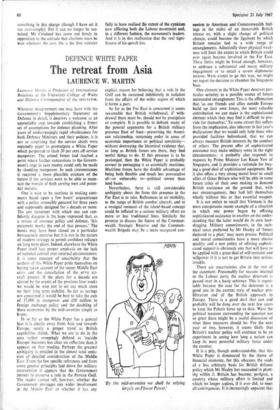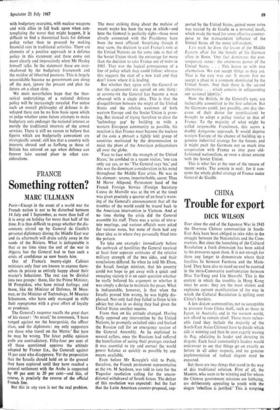The retreat from Asia
DEFENCE WHITE PAPER LAURENCE W. MARTIN
Laurence Martin is Professor of International Relations at the University College of Wales and Defence Correspondent of the SPECTATOR.
Whatever disagreement one may have with the Governments Supplementary Statement on Defence in detail, it deserves a welcome as an appreciable step towards establishing a firmer set of assumptions for defence planning. After years of embarrassingly rapid obsolescence for both Defence Ministers and their policies, it is not so surprising that the service chiefs were reputedly eager to promulgate a White Paper which purported to slash 20 per cent off service manpower. The armed forces had reached a point where further concessions to the Govern- ment's urge to save money could only be made by shedding manpower. In such circumstances it required a more plausible estimate of the future if the services were to be able to main- tain the morale of both serving men and poten- tial recruits.
One is wise to be cautious in making com- ments based upon a few hours' acquaintance with a policy ostensibly gestated for three years and supposedly designed for a decade or more. The one statement with which one can con- fidently disagree is the hope expressed that, as a review of overseas policy and defence, 'this statement marks the end of that process.' The books may have been closed on a particular bureaucratic exercise but it is not in the nature of modern strategy to permit confident reliance on long term plans. Indeed, elsewhere the White Paper itself lays proper emphasis on the lack of national control over external circumstances; it is some measure of uncertainty that the authors of this White Paper pride themselves on having taken account of the recent Middle Mist crisis and the cancellation of the AFVG air- craft project. If the plans for a decade are altered by the events of the previous four weeks we would be wise not to set too much store on their long term stability. So far as savings are concerned it would be best to take the cuts of 37,000 in manpower and £50 million in foreign exchange policy and the doubling of these economies by the mid-seventies simply as hopes.
In so far as the White Paper has a general bias it is clearly away from Asia and towards Europe, surely a proper trend as British capabilities shrink. What we are to do in the area rather sweepingly defined as 'outside Europe' becomes less clear on reflection than it appears on first reading. Perhaps the greatest ambiguity is entailed in the almost total omis- sion of detailed consideration of the Middle East. From the few specific references and from some general principles laid down for military intervention it appears that the Government intends to preserve a role in the Persian Gulf. The reader cannot tell, however, whether the Government envisages any wider involvement in the Middle East or whether it has any explicit reason for believing that a role in the Gulf can be sustained indefinitely in isolation from the affairs of the wider region of which it forms a part.
So far as the Far East is concerned it seems reasonable that British withdrawal, if with- drawal there must be, should not be precipitate or complete. It is possible to debunk many of the general arguments for a British military presence East of Suez—preserving .the Ameri- can relationship, sustaining order in areas of economic importance or political sensitivity— without destroying the historical evidence that, so long as British forces are there, they find useful things to do. If this presence is to be prolonged, then the White Paper is probably correct in envisaging it as essentially maritime. Maritime forces have the double advantage of being both flexible and much less provocative of—or vulnerable to—political unrest than land bases.
Nevertheless, there is still considerable ambiguity about the form this presence in the Far East is to take. References to air mobility, to the range of British combat aircraft, and to a vestigial remnant of the island-based concept could be inflated to a serious military effort on more or less traditional lines. Similarly the promise to discuss the future of the Common- wealth Strategic Reserve and the Common- wealth Brigade may be a mere rearguard con- 'By the mid-seventies we shall be relying largely on Flower Power.' cession to American and Commonwealth feel- ings in the midst of an inexorable British retreat or, with a slight change of political climate, could become the ligament by which Britain remains tied to a wide range of entanglements. Admittedly sheer physical weak- ness will limit the extent to which Britain could ever again become involved in the Far East. These limits might be broad enough, however, to embrace a substantial and messy military engagement or to entail a severe diplomatic reverse. Were events to go this way, we might yet regret the decision to abandon the Singapore base.
One element in the White Paper deserves par- ticular scrutiny as a possible source of future unintended entanglement. This is the affirmation that 'as our friends and allies outside Europe build up their own forces, the most valuable contribution we can make is the sophisticated element which they may find it difficult to pro- vide for themselves.' To some extent this suffers from the implication, also inherent in last year's declarations that we would only help those who provided facilities beforehand, that we can always measure British interests by the conduct of others. The present offer of sophisticated assistance may make military sense in the right circumstances : it probably also responds to requests by Prime Minister Lee Kuan Yew of Singapore, and it provides a rationale for buy- ing a good deal of sophisticated equipment But it also offers a very strong moral lever to small allies of Great Britain who will be able in some future crisis of their own making to demand British assistance on the ground that, with our encouragement, they had left themselves wholly without this or that essential weapon.
It is not unfair to recall that Vietnam is the most conspicuous recent example of a situation in which one power began by offering sophisticated assistance to another on the under- standing that the latter would do its own foot- slogging. Military commitments, in the tech- nical sense preferred by Mr Healey of 'forces declared to a plan,' may seem precise. Political and moral commitments have a more elusive quality; and a new policy of offering sophisti- cated support is obviously one that will have to be applied with a great deal of self-restraint and willpower if it is not to get Britain into serious trouble.
There are uncertainties also in the rest of the statement. Presumably for reasons internal to the Labour party the nuclear deterrent is passed over in a hasty sentence. This is regret- table because the case for the deterrent is a good one in the current state of nuclear pro- liferation and of the British approach to Europe. There is a good deal that can and probably will be done over the next few years to keep the Polaris force up to date. Were the political tensions surrounding the question not so great there might be a useful discussion of what these measures should be. For the next year or two, however, it seems likely that Britain's nuclear policy will continue to be an experiment in seeing how long a nation can keep its most powerful military force under the counter.
It is a pity, though understandable, that this White Paper is dominated by the theme of financial economy, for this obscures the seeds of a less arbitrary basis for British defence policy which Mr Healey has succeeded in plant- ing within it. Britain has become, perfprce, a country whose military effort is limited and which no longer aspires, if it ever did, to meet all contingencies. It is increasingly apparent that with budgetary restraints, with nuclear weapons and with allies to fall back upon when con- templating the worst that might happen, it is difficult to find a theoretical basis for defence policy rather than to proceed by making financial cuts in traditional activities. There are elements of a positive approach to a defence policy in this statement and these come out more clearly and impressively when Mr Healey himself talks. In the statement these are over- shadowed by the budgetary framework and the residue of inherited postures. This is largely unavoidable because no government can shrug off the past, ignore the present and plan the future on a clean slate.
We must nevertheless hope that the theo- retical undertakings of a rational defence policy will be increasingly revealed. For unless such an overall philosophy of defence is de- veloped there can be no firm basis upon which to judge whether some future attempts to make budgetary cuts endanger the national interest or merely the traditional interests of the armed services. There is still no reason to believe that figures which are budgetarily convenient are strategically sound; still less that a country with interests abroad and as farflung as those of Britain has entered an age when defence can forever take second place to other con- siderations.































 Previous page
Previous page